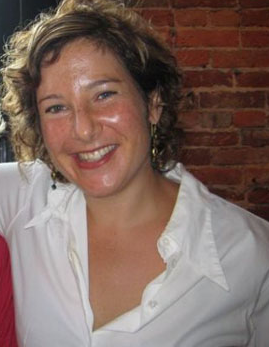 I was lucky to have the chance to conduct a phone interview with ana Sophia joanes recently. Ana is the director of the terrific food documentary “Fresh,” which has taken the Twin Cities by storm this summer and doesn’t seem to be letting up anytime soon (additional screenings are scheduled for the Birchwood Cafe on their big screen later this month). “It’s been an unexpected and amazing response,” ana says, “just completely grassroots and word of mouth. It’s exploding and it says something about a need or demand or some kind of mood out there.” I agree! Here’s our interview:
I was lucky to have the chance to conduct a phone interview with ana Sophia joanes recently. Ana is the director of the terrific food documentary “Fresh,” which has taken the Twin Cities by storm this summer and doesn’t seem to be letting up anytime soon (additional screenings are scheduled for the Birchwood Cafe on their big screen later this month). “It’s been an unexpected and amazing response,” ana says, “just completely grassroots and word of mouth. It’s exploding and it says something about a need or demand or some kind of mood out there.” I agree! Here’s our interview:
Lee: The film FRESH has an upbeat, optimistic quality to it. Did the process of making the documentary change your view of our food system? Did it make you more or less optimistic? Why?
Ana: The [movie’s tone] definitely had to do with how I felt, how we’re confronted with doom and gloom in our daily lives, everywhere we turn. I was feeling incredibly powerless. Not only angry and scared, but powerless. Which leads to paralysis. “What’s the point in - finish the sentence [however you want] - eating healthy, or even changing a light bulb, when we’re building new coal plants everyday, or whatever.” But that couldn’t be right. I’m not a passive observer of the world, I’m part of the world - it just doesn’t feel that way anymore. The movie was an attempt to capture the sense that we are not victims of our world. The movie is hopeful and upbeat because we need that. The whole Obama campaign was “yes, we can” - we can make the changes we want. People are ready for something different. And the more I was learning about people that inspired me, the more I wanted to do something about it.
Lee: What surprised you in the course of making this film?
Ana: When I started making the film, I didn’t know anything about our food system. But even though learning about the corn economy and the amount of energy consumption in the food industry was shocking, these facts became background noise. What really surprised me was how common sensical the solutions are. Our current system is completely absurd. Every time I met with a farmer I felt like, “duh! what you say makes so much sense” The things that work, they really make sense.
Farmer after farmer I spoke with communicated something bigger than health or environment - they communicated meaning. We forget how much of a miracle is involved in growing food. A plant turning energy into food we can consume is pretty amazing. I realized how much of a yearning I had for this feeling, this real meaning.
 Lee: How did you integrate that feeling into your life?
Lee: How did you integrate that feeling into your life?
Ana: It took a while to acknowledge that yearning. We’re quite a religious nation, but I never thought of my self as a spiritual person. It took a while to recognize what I saw in the farmers that were so amazing. My movie is about much more than food. Food is an entry point to discuss our relationship to ourselves, each other, and the world around us.
The film is about reconnecting with our yearning for meaning, and then acting on it, which means living a mindful life. Being mindful of how we treat friends, neighbors, and lovers. It’s not something you can completely achieve. It’s an intention of living a life where you’re aware. Awareness used to feel like a burden to me, but now it feels just the opposite. Awareness is freeing, it creates meaning. When you do things according to your heart. Joel [Salatin] says that everything he does in his life is sacred. And I felt like, “wow, it’s true, everything you do has a consequence and a meaning.“ And realizing that feels good.
Lee: I’ve been surprised to learn how political food is, how much personal and public politics is wrapped up in it. Did you feel that way making the film?
Ana: When I started making the film, I thought that food was completely apolitical. It’s the one issue where the radical person can agree with the religious, homeschooling mom. In some ways, it’s not a political issue whatever - we’re all concerned about our food. But it’s incredibly political as it related to our government’s policy. It was intentional to make a movie that anyone can watch - I don’t see any point in being righteous or controversial.
We need to bring people into the discussion where they are. I met a young man who works for the Gap dining service in New York, and he’s trying hard to make the dining services at the Gap greener, and I think that’s amazing. It doesn’t matter that they might not change all of their production. We need to think in increments and we need a lot of different things happening if we’re going to have change. We can’t wait until everybody’s perfect to change.
This post was proudly submitted to Food Renegade's Fight Back Friday.



